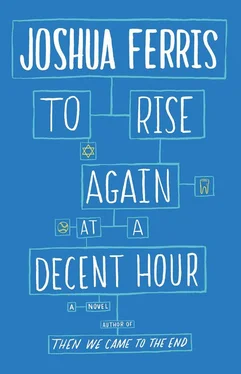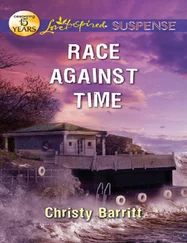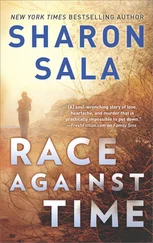Connie came up to me later that day and said, “Did you ever tell a joke about a priest and a rabbi to my uncle Michael?”
Her uncle Michael was married to her mother’s sister Sally. He had a real-estate inspection business. Sally had stayed home with the kids, all grown now. They lived in a small house in Yonkers, but it was the right house, the perfect house. Somehow you knew that the minute you walked in. Considerate, warm people live here, you thought, people who know they have enough. It’s some kind of gift to realize you have enough and need no more. I was only in the house once, when Uncle Michael’s mother passed away and they sat shiva. I’d never sat shiva before. I’d hardly known about the practice and had to look it up on the Internet so as not to appear hopeless before Connie. So many people gathered nightly to sit shiva for Uncle Michael’s mother in Michael and Sally’s modest house that it was almost a shock when, after an hour or so, the Mourner’s Kaddish was sung, reclaiming the solemnity of the occasion from an almost-festive atmosphere. It was never festive in the immediate proximity of Uncle Michael or Aunt Sally or their children or any of Michael’s brothers and sisters, but for those of us out on the margins, where I was lurking, there was a lot of small talk and friendly conversation. I guess it was like any other funeral ceremony that way, a periphery of noise surrounding a nucleus of grief. But I also knew that it was unlike anything I’d experienced before, the act of sitting shiva. An Irish son attends a wake and buries the dead and then sits at home in private despair, but a Jewish son has seven nights to share his burden and his broken heart with his family and friends.
“A priest and rabbi joke?” I said. “Where’s this coming from? I haven’t seen Michael in, what? Six months?”
“This would have been a long time ago.”
“Why are you bringing it up now?”
“There was a rumor. I ignored it at the time. I thought people were just being difficult. Do you know a joke about a priest and a rabbi or not?”
I was quiet. “I know lots of jokes.”
“How many concern a priest and a rabbi?”
I pretended to think about it.
“Let me hear one,” she said.
I cleared my throat. “A priest and a rabbi… ahem… excuse me. Okay, a priest and a rabbi hit the links bright and early one morning for a round of golf, but the foursome ahead of them keep holding them up.” I paused. “I learned this joke back when I was playing golf. That was a lifetime ago, Connie. I haven’t played golf in… Why do you want to know this?”
“I want to hear the joke you told my uncle Michael.”
“I’m not sure I would have told your uncle Michael this joke.”
“Tell me the joke, Paul.”
I preferred to be called Dr. O’Rourke inside the office, or even Dr. Paul, but I made no mention of this breach in protocol.
“So they call the ranger over — actually, come to think of it, it’s a priest, a reverend, and a rabbi, the three of them together are going golfing. Like I said. It’s been a long time.” She gestured as if I were driving too slowly in the car in front of her. “Anyway, they call the ranger over, and the priest says, ‘We’ve been waiting to tee off for twenty minutes now, but those fellows ahead of us are taking an eternity. What gives?’ The ranger apologizes. ‘I can see why you men of God would be irritated,’ he says, ‘but have patience. Those poor men ahead of you are blind.’ The priest replies with a Hail Mary and a blessing, while the reverend says a prayer.”
I stopped.
“Why are you stopping?”
“Should I go on?”
“Is that the punch line?”
“No.”
“Tell me the punch line.”
“But the rabbi, he takes the ranger aside and he says, ‘They can’t play at night?’ ”
“That’s good,” she said, without smiling.
“You’re not smiling.”
“I’m curious to know why you thought it was an appropriate joke to tell my uncle Michael.”
If I told Michael that joke, it was because I wanted to make him laugh. I wanted him to like me. I wanted them all to like me. I wanted to be a Plotz. I wanted to be a Jewish Plotz who sat shiva and went to shul and made babies with Connie behind the bulwark of safety that was the Plotz extended family.
“Why,” I said, “is it anti-Semitic? It’s not anti-Semitic, is it?”
I was always paranoid that I might be saying something anti-Semitic.
“The man was sitting shiva for his mother,” she said.
“What?”
“Didn’t it occur to you that it might be bad timing?”
“No, Connie,” I said, “that’s not when I told him that joke. I wouldn’t have told him that joke then. I wouldn’t have told him any joke then. Who told you I did that?”
“I told you, it was a rumor. I didn’t give it a second thought.”
“And you shouldn’t now! Connie, come on, I wouldn’t have told Michael a joke while the man was sitting shiva. I have better sense than that.”
“Is that right, Paul Saul?” she said. “Tell me, please, all about your better sense.”
I left her to tend to a patient.
I had passed Carlton B. Sookhart’s Rare Books and Antiquities just off Park Avenue many times over the years and never dreamed I’d have reason to stop in. I did so that Friday. His office was part rare-books showcase, part cabinet of wonders. The main room was dressed in double-wide planks of Brazilian hardwood that howled underfoot like a splintering ship. A rolling ladder of matching hue tracked along the tall bookshelves where whispered all the dead and vital moments of human history. His desk was set off by a single step and a railing of twisting balusters as delicate as blown glass. Suspended behind him in Plexiglas sat an ancient sword with a gem-encrusted handle—“from the Crusades,” he said — and in the display case directly to his right, skulls aligned on one shelf obediently peered out into eternity. Our conversation began with an explanation of the rock on his desk, which looked like your average rock, no bigger than a baseball, but was in fact from a famous archaeological dig in Jerusalem. It now served Sookhart as paperweight. I felt sorry for any rock forced to leave a kingdom of buried secrets to sit on top of invoices in a cloistered room on Eighty-Second Street.
I told him about the appearance of an unsolicited website for my dental practice and the fraudulent postings made in my name.
“Have you heard of something called the Cantaveticles?” I asked him.
“The Cantaveticles,” he said. “What’s that?”
“A collection of cantonments?”
“And what is a cantonment?” he asked.
Every word was an inflection shy of a phony British accent. His shirtsleeves were turned up and his arms exposed to the elbow; as we talked, he stroked, a little obscenely, I thought, the copious white curls of his arm hair.
Sookhart had brokered many high-profile transactions over the years: one between a Jordanian and the Israel Museum for a fragment of the Dead Sea Scrolls, a second involving an original Gutenberg Bible. He served as seller’s agent in both deals. In the late nineties, his reputation suffered a blow when a private collector and thermal chemist accused Sookhart of forgery. Carbon testing proved his dating of a leaf of the Aleppo Codex (from the long-missing Torah section) was off by several centuries. The Internet is a treasure tomb.
I handed him a printout of my bio page, which prompted him to pat himself down before finding his reading glasses on his desk.
“No, no, this is all wrong,” he said once he’d finished and removed his glasses. “The Israelites didn’t attack the Amalekites. The Amalekites attacked the Israelites.” Quickly licking his thumb and index finger, he flicked through the King James on his desk with Google speed. “ ‘Remember what Amalek did unto thee… when ye were come forth out of Egypt; how he met thee by the way, and smote the hindmost of thee… when thou wast faint and weary; and he feared not God.’ ”
Читать дальше












